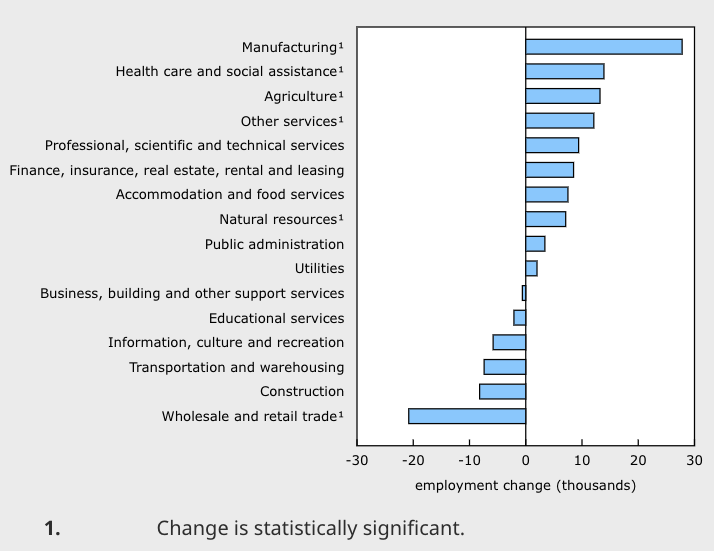Search VernonNow
The unemployment rate remained unchanged at 7.1 per cent in September, according to new data from Statistics Canada.
That’s despite the number of people employed increasing by 60,000, with the employment rate up 0.1 percentage points to 60.6 per cent.
Manufacturing (+28,000), health care (+14,000) and agriculture (+13,000) all saw significant increases in employment last month.
.png)
Wholesale and retail trade, however, recorded a major decline, losing 21,000 positions.
In British Columbia, the unemployment rate increased by 0.2 percentage points to 6.4 per cent.
That’s still well below Alberta (7.8 per cent) and Ontario (7.9 per cent), but higher than Quebec (5.7 per cent) and Saskatchewan (six per cent).
Across BC, individual cities reported the following unemployment rates:
Kelowna: 7.1 per cent (up from 4.1 per cent in August)
Kamloops: 9.5 per cent (down from 10.3 per cent)
Chilliwack: 6.4 per cent (up from 6.1 per cent)
Abbotsford-Mission: 7.2 per cent (up from 6.8 per cent)
Vancouver: 6.3 per cent (up from 6.1 per cent)
Victoria: 4.8 per cent (down from 5.1 per cent)
Nanaimo: 8.4 per cent (down from 8.5 per cent)
Reacting to the news, Minister of Jobs Ravi Kahlon first pointed to "serious challenges" presented by "Donald Trump's attacks on our economy and sovereignty," but claimed BC remains the "economic engine of Canada."
"Despite these challenges, BC leads Canada in private-sector job growth and is holding steady working to build an economy that can stand on its own two feet," he added.
Kahlon said the BC NDP government is planning to introduce "more than a dozen bills this session," adding: "Our government is focused on standing up for people in British Columbia and plan to introduce more than a dozen bills this session. This includes a bill that will ensure the North Coast Transmission Line plays a key role in building an economy that's less reliant on the United States and creates good jobs."
His opposite number, Gavin Dew with the BC Conservatives, had a different view of today's news.
“This government keeps trying to claim BC’s economy is strong. But the numbers tell a very different story, and it’s even worse when you actually talk to small business people,” he said.
Dew spoke with NowMedia earlier this week to discuss what he said was a dire situation for BC businesses.
In his statement reacting to today's job figures, he said: "British Columbians are paying the price for a government that has driven the small business economy into a ditch and slashed the tires."
Dew emphasized his concerns about joblessness among young people, which is at 13.3 per cent, claiming that "Eby's self-inflicted public safety crisis has decimated our downtown storefronts, robbing a generation of their first jobs."
Across Canada, employment was up among core-aged workers (aged 25 to 54), with women gaining 76,000 jobs and men 33,000.
Among the 55+ group, however, employment fell 44,000.

There was “little change” for those aged 15 to 24, according to Statistics Canada.
The agency also said the number of full-time workers increased by 106,000, while the number of part-time workers declined 46,000.
Average wages were up by 3.3 per cent year-over-year, reaching $36.78.
.png)
In its data release this morning, Statistics Canada also reported that 34.7 per cent of recent immigrants in the country had reported being “overqualified for their job.”
That’s up 4.2 percentage points compared with September last year.
The Bank of Canada, which cut its policy rate to 2.5 per cent in September, is set to make its next decision on Oct. 29.